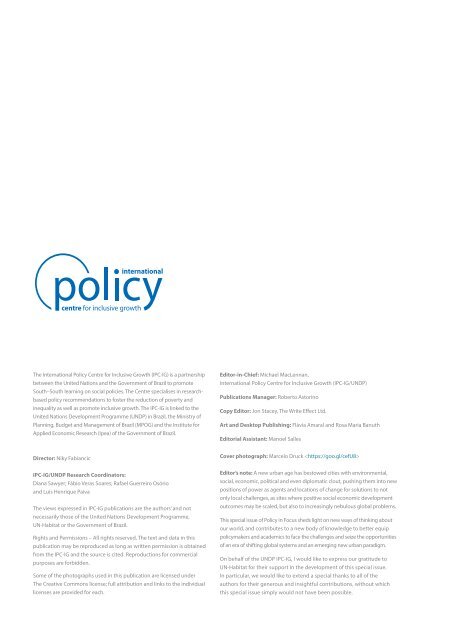A new urban paradigm pathways to sustainable development
PiF37
PiF37
Create successful ePaper yourself
Turn your PDF publications into a flip-book with our unique Google optimized e-Paper software.
The International Policy Centre for Inclusive Growth (IPC-IG) is a partnership<br />
between the United Nations and the Government of Brazil <strong>to</strong> promote<br />
South–South learning on social policies. The Centre specialises in researchbased<br />
policy recommendations <strong>to</strong> foster the reduction of poverty and<br />
inequality as well as promote inclusive growth. The IPC-IG is linked <strong>to</strong> the<br />
United Nations Development Programme (UNDP) in Brazil, the Ministry of<br />
Planning, Budget and Management of Brazil (MPOG) and the Institute for<br />
Applied Economic Research (Ipea) of the Government of Brazil.<br />
Edi<strong>to</strong>r-in-Chief: Michael MacLennan,<br />
International Policy Centre for Inclusive Growth (IPC-IG/UNDP)<br />
Publications Manager: Rober<strong>to</strong> As<strong>to</strong>rino<br />
Copy Edi<strong>to</strong>r: Jon Stacey, The Write Effect Ltd.<br />
Art and Desk<strong>to</strong>p Publishing: Flávia Amaral and Rosa Maria Banuth<br />
Edi<strong>to</strong>rial Assistant: Manoel Salles<br />
Direc<strong>to</strong>r: Niky Fabiancic<br />
IPC-IG/UNDP Research Coordina<strong>to</strong>rs:<br />
Diana Sawyer; Fábio Veras Soares; Rafael Guerreiro Osório<br />
and Luis Henrique Paiva<br />
The views expressed in IPC-IG publications are the authors’ and not<br />
necessarily those of the United Nations Development Programme,<br />
UN-Habitat or the Government of Brazil.<br />
Rights and Permissions – All rights reserved. The text and data in this<br />
publication may be reproduced as long as written permission is obtained<br />
from the IPC-IG and the source is cited. Reproductions for commercial<br />
purposes are forbidden.<br />
Some of the pho<strong>to</strong>graphs used in this publication are licensed under<br />
The Creative Commons license; full attribution and links <strong>to</strong> the individual<br />
licenses are provided for each.<br />
Cover pho<strong>to</strong>graph: Marcelo Druck <br />
Edi<strong>to</strong>r’s note: A <strong>new</strong> <strong>urban</strong> age has bes<strong>to</strong>wed cities with environmental,<br />
social, economic, political and even diplomatic clout, pushing them in<strong>to</strong> <strong>new</strong><br />
positions of power as agents and locations of change for solutions <strong>to</strong> not<br />
only local challenges, as sites where positive social economic <strong>development</strong><br />
outcomes may be scaled, but also <strong>to</strong> increasingly nebulous global problems.<br />
This special issue of Policy in Focus sheds light on <strong>new</strong> ways of thinking about<br />
our world, and contributes <strong>to</strong> a <strong>new</strong> body of knowledge <strong>to</strong> better equip<br />
policymakers and academics <strong>to</strong> face the challenges and seize the opportunities<br />
of an era of shifting global systems and an emerging <strong>new</strong> <strong>urban</strong> <strong>paradigm</strong>.<br />
On behalf of the UNDP IPC-IG, I would like <strong>to</strong> express our gratitude <strong>to</strong><br />
UN-Habitat for their support in the <strong>development</strong> of this special issue.<br />
In particular, we would like <strong>to</strong> extend a special thanks <strong>to</strong> all of the<br />
authors for their generous and insightful contributions, without which<br />
this special issue simply would not have been possible.


